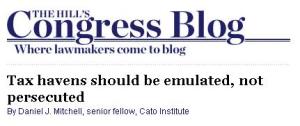Since I just left Monaco and am now in Geneva, this is an appropriate time to extol the virtues of so-called tax havens.
But I don’t merely say nice things about low-tax jurisdictions when I’m in friendly environments.
I believe in swinging my sword in the belly of the beast.
That’s why I recently defended tax havens and tax competition for the fiscal heathens who read the New York Times.
In an even bigger display of futile optimism, I also just explained the benefits of tax competition, fiscal sovereignty, and financial privacy for the kleptocrats in Congress.
Here’s some of what I wrote for The Hill, starting with the obvious point that it is preposterous to blame tax havens for the financial crisis.
When the financial crisis hit, politicians from high-tax nations didn’t let the crisis go to waste. Acting through the G-20, they launched an attack on so-called tax havens, asserting that “hot money” from the offshore world somehow had caused the banking system to become unstable. This campaign against low-tax jurisdictions made no sense. Nobody in the Cayman Islands or Monaco was responsible for the Federal Reserve’s easy money. Nobody in Panama or Singapore had anything to do with the corrupt system of Fannie Mae/Freddie Mac subsidies.
I then explained that tax havens once again are being attacked, though in this case multinational corporations are the main victims of a new scheme by the parasitical bureaucrats at the OECD.
So-called tax havens will suffer collateral damage, though, since big firms use them as very desirable platforms for a significant chunk of cross-border economic activity.
Recommended
Tax havens are being attacked again… Funded with American tax dollars, the Organization for Economic Cooperation and Development (OECD) published a report on “Addressing Base Erosion and Profit Shifting,” (BEPS) and will follow up in a few months with specific recommendations. This new OECD scheme is targeting multinational companies for a big tax hike, probably by requiring global tax returns, but that means tax havens are in the cross hairs because their pro-growth tax policies make them attractive locations for cross-border economic activity. Indeed, the OECD specifically has complained that “small jurisdictions act as conduits, receiving disproportionately large amounts of Foreign Direct Investment compared to large industrialised countries and investing disproportionately large amounts in major developed and emerging economies.” …its new campaign isn’t just targeting small tax havens, but will also undermine the relatively attractive fiscal systems in nations such as Ireland, Hong Kong, Switzerland, Slovakia, Singapore, Estonia, and the Netherlands. The burden of this will fall not on companies, but on workers, consumers, and shareholders.
I close with a warning that tax havens and tax competition are one of the few restraints on the greed of the political class. We need to preserve these liberalizing forces if we want to protect ourselves from even worse fiscal policy.
 …anti-tax haven demagoguery is perfectly acceptable in political circles since it is seen as expanding the power of government over taxpayers. The real issue we should be addressing is whether we need some sort of external constraint to protect us from fiscal crises that are triggered by the overspending and overtaxing of the political class. For a couple of decades following the Reagan and Thatcher tax cuts, governments around the world have been forced by tax competition to lower tax rates, reduce double taxation of saving and investment and reform their tax system. Defenders of the welfare state and proponents of class-warfare tax policy have resented this liberalizing process and grab any opportunity to demonize tax havens, particularly since these jurisdictions have strong human rights laws that protect the financial privacy of investors.
…anti-tax haven demagoguery is perfectly acceptable in political circles since it is seen as expanding the power of government over taxpayers. The real issue we should be addressing is whether we need some sort of external constraint to protect us from fiscal crises that are triggered by the overspending and overtaxing of the political class. For a couple of decades following the Reagan and Thatcher tax cuts, governments around the world have been forced by tax competition to lower tax rates, reduce double taxation of saving and investment and reform their tax system. Defenders of the welfare state and proponents of class-warfare tax policy have resented this liberalizing process and grab any opportunity to demonize tax havens, particularly since these jurisdictions have strong human rights laws that protect the financial privacy of investors.
For further information, I highly recommend the writings of Allister Heath and Pierre Bessard.

























Join the conversation as a VIP Member